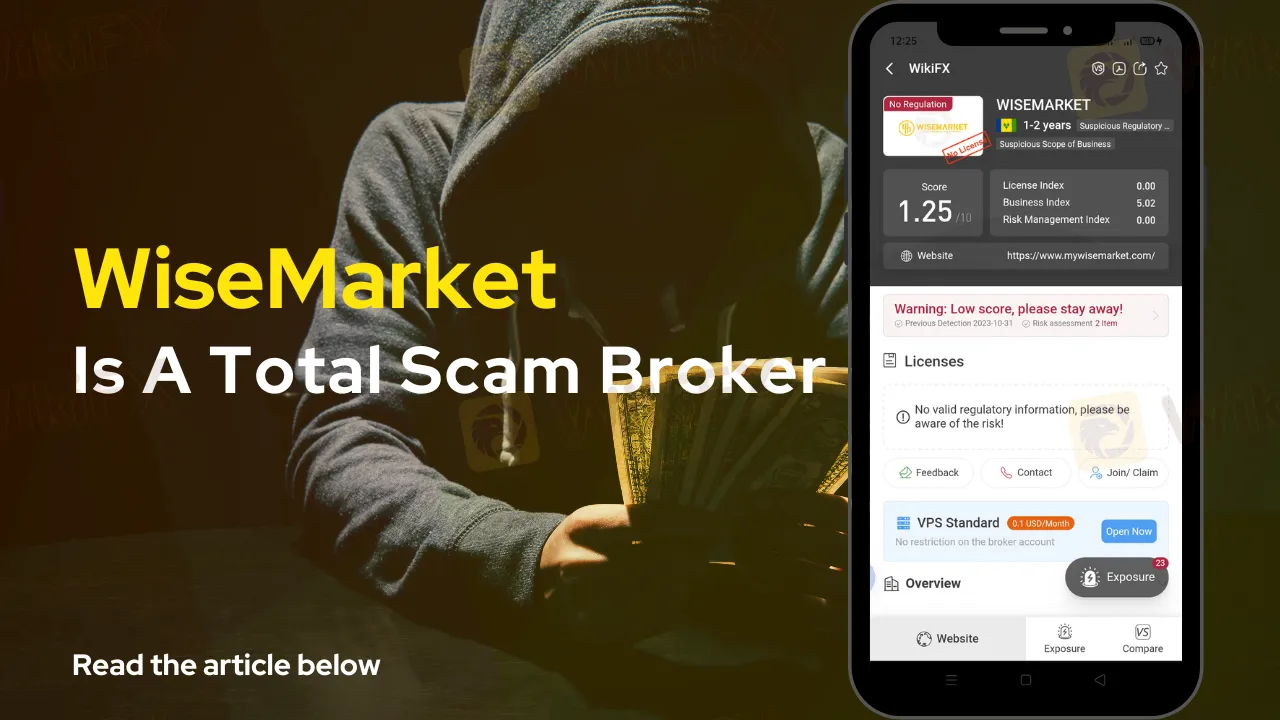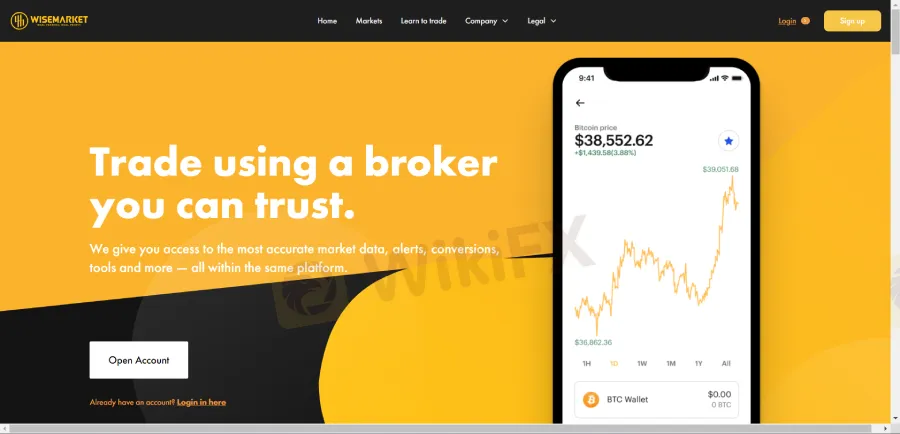简体中文
繁體中文
English
Pусский
日本語
ภาษาไทย
Tiếng Việt
Bahasa Indonesia
Español
हिन्दी
Filippiiniläinen
Français
Deutsch
Português
Türkçe
한국어
العربية
All Eyes Here! WiseMarket Is A Total Scam Broker
Abstract:Exposing WiseMarket: Under the guise of reliable forex and crypto trading, this broker's questionable withdrawals and misleading association with the Fira indicator have alarmed traders. With regulatory inconsistencies adding to the concerns, WiseMarket's trustworthiness is seriously in doubt. Investors, beware of this potential scam!

In the ever-expanding world of forex, crypto, and stock trading, traders are always on the lookout for reliable brokers. However, recent findings suggest that not all glitters are gold. WiseMarket, a broker that gained traction through promising ads and its association with the Fira indicator, might not be as reliable as it seems.
WiseMarket's Shady Operations
WiseMarket has been in the limelight recently for its aggressive marketing on social media platforms, promising guaranteed profits with the help of the Fira indicator. However, Fira is not a proprietary tool of WiseMarket but is operated by a third party.

The spotlight turned sour when a trader voiced concerns about WiseMarket's withdrawal process. He highlighted that the broker has held back his withdrawal request for over four months, only to respond with repetitive emails. This wasn't an isolated case, as other traders shared similar experiences. These consistent patterns hint at a potential misuse of trader funds.
While WiseMarket's operations don't scream “Ponzi Scheme,” their approach mirrors many scam brokers that entice people to invest using such strategies. With the Fira indicator as bait, they may have lured many unsuspecting traders.
WiseMarket: The Hidden Truth About Withdrawals? - The Case
When we trust a company with our hard-earned money, we expect transparency, honesty, and respect in return. But what happens when the same company betrays our trust? A trader with WiseMarket recently shared a concerning story, shedding light on some questionable practices of the trading company.
Our anonymous trader revealed that he has been trying to withdraw his funds, a sum of $4600, for the past four months. Every time he approached WiseMarket for his withdrawal, the company would simply reply with the same email. But what's more alarming is that this isn't an isolated incident, but rather a pattern.
Image #1

Image #2

Image #3

Image #4

Image #5

See other WiseMarket complaints through the link below:
https://www.wikifx.com/en/dealer/2699104886.html
Many might wonder, “Why would WiseMarket hold back someone's money?” There could be numerous reasons, but the primary suspicion is that they might be using their traders' money for some undisclosed purposes. It's a strategy some unethical companies use: they delay withdrawals to utilize the funds elsewhere, all the while giving customers the runaround.
The trader mentioned that he had joined WiseMarket under the Fira indicator. For those unaware, indicators are tools or strategies used in trading. The Fira indicator was a lure that brought him and potentially many others to WiseMarket. But sadly, Fira and their team havent stepped up to address the issues. The silence from them further raises eyebrows. Is it negligence, or are they part of a larger scheme?
To the unsuspecting public, WiseMarket might appear as just another trading platform. But stories like these remind us to be cautious and ask questions. Where is the trader's money? Why is WiseMarket not being straightforward? And why is the Fira team so silent?
For now, the mystery remains. But one thing is clear: if you're considering trading or investing with WiseMarket, it might be a wise idea to think twice. And if you're already with them, keep a close eye on your funds.
Stay informed and always make sure to do your research before entrusting your money with any company. After all, it's not just about the money; it's about trust.

Regulatory Concerns
To compound the concerns, it seems WiseMarket may not be as regulated as they claim. While they profess to be incorporated in Saint Vincent And Grenadines, the SVGFSA website clearly states that forex trading brokerage activities are not licensed in the region. This discrepancy is a red flag for anyone considering investing with them.
Related article:
Conclusion
For the everyday trader, trust in a broker is paramount. WiseMarket's questionable practices, combined with regulatory concerns, paint a picture of potential deceit. Prospective traders and current users should exercise caution, conduct thorough research, and possibly reconsider their association with WiseMarket. After all, in the world of trading, it's not just about profits but ensuring the safety and security of your investments.

Disclaimer:
The views in this article only represent the author's personal views, and do not constitute investment advice on this platform. This platform does not guarantee the accuracy, completeness and timeliness of the information in the article, and will not be liable for any loss caused by the use of or reliance on the information in the article.
Read more

Malaysian Influencer Detained in Taiwan Over Alleged Role in Fraud Scheme
Malaysian influencer Hu Chang Mun, widely known as Ady Hu, has been detained in Taiwan for his alleged involvement in a fraudulent operation. The 31-year-old, who was reported missing earlier in December, was located by Taiwanese authorities after suspicions arose regarding his activities.

MultiBank Group Wins Big at Traders Fair Hong Kong 2024
Discover how MultiBank Group, a global leader in financial derivatives, secured three prestigious awards at Traders Fair Hong Kong 2024, highlighting its innovative trading solutions and industry excellence.

CySEC Settles Compliance Case with Fxview Operator Charlgate Ltd
Discover how CySEC resolved compliance issues with Charlgate Ltd, the operator of Fxview, through a €50,000 settlement. Explore the investigation, regulatory measures, and CySEC's new website designed for improved accessibility and transparency.

TradingView Launches Liquidity Analysis Tool DEX Screener
Discover TradingView's DEX Screener, a powerful tool for analyzing decentralized exchange trading pairs. Access metrics like liquidity, trading volume, and FDV to make smarter, data-driven trading decisions.
WikiFX Broker
Latest News
CFI Partners with MI Cape Town, Cricket Team
Doo Financial Expands Reach with Indonesian Regulatory Licenses
Volkswagen agrees deal to avoid Germany plant closures
Geopolitical Events: What They Are & Their Impact?
Webull Canada Expands Options Trading to TFSAs and RRSPs
CySEC Launches Redesigned Website Packed with New Features
WikiEXPO Global Expert Interview: Simone Martin—— Exploring Financial Regulation Change
TradingView Launches Liquidity Analysis Tool DEX Screener
MultiBank Group Wins Big at Traders Fair Hong Kong 2024
WikiFX Review: Is PU Prime a decent broker?
Currency Calculator



